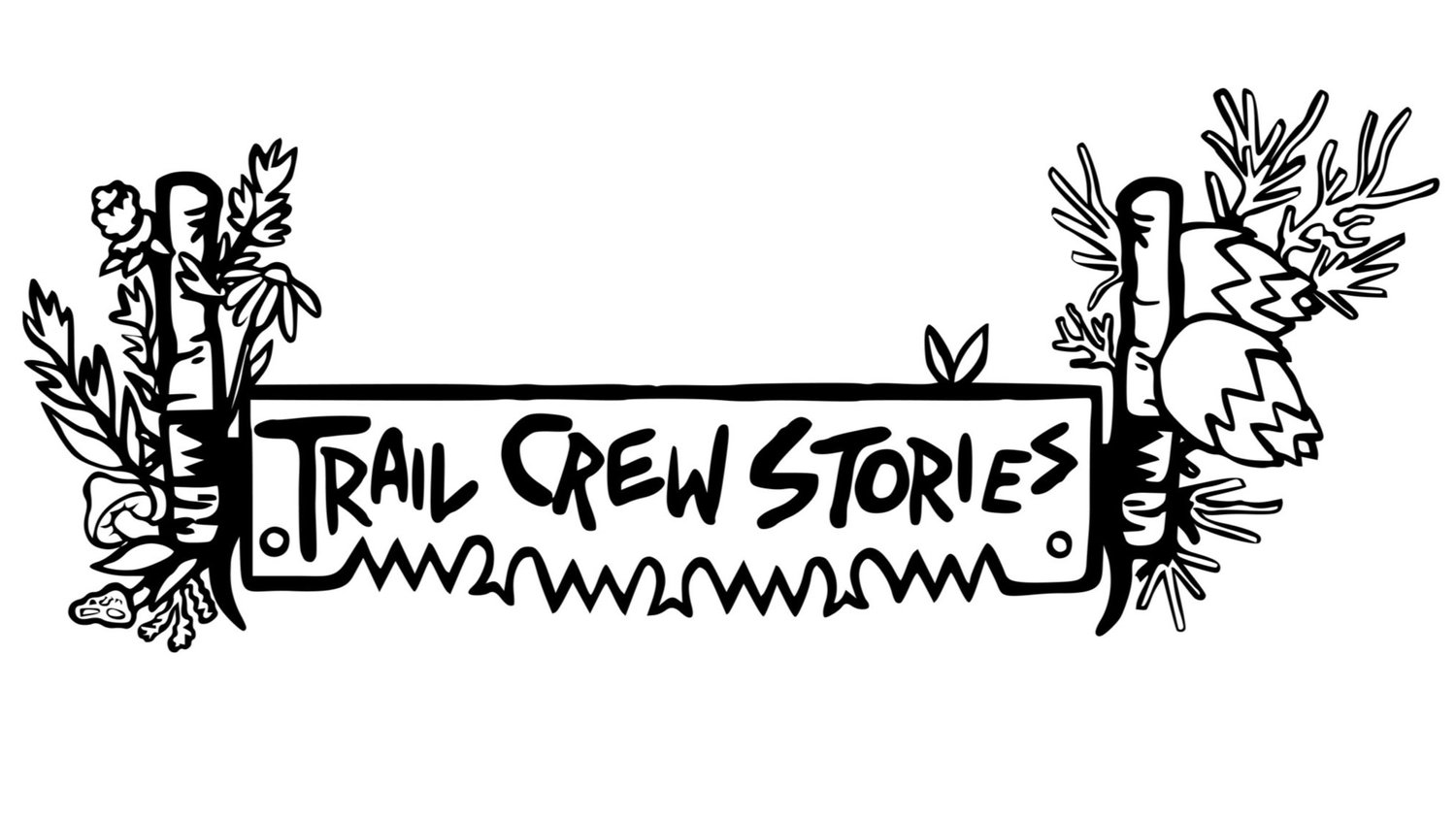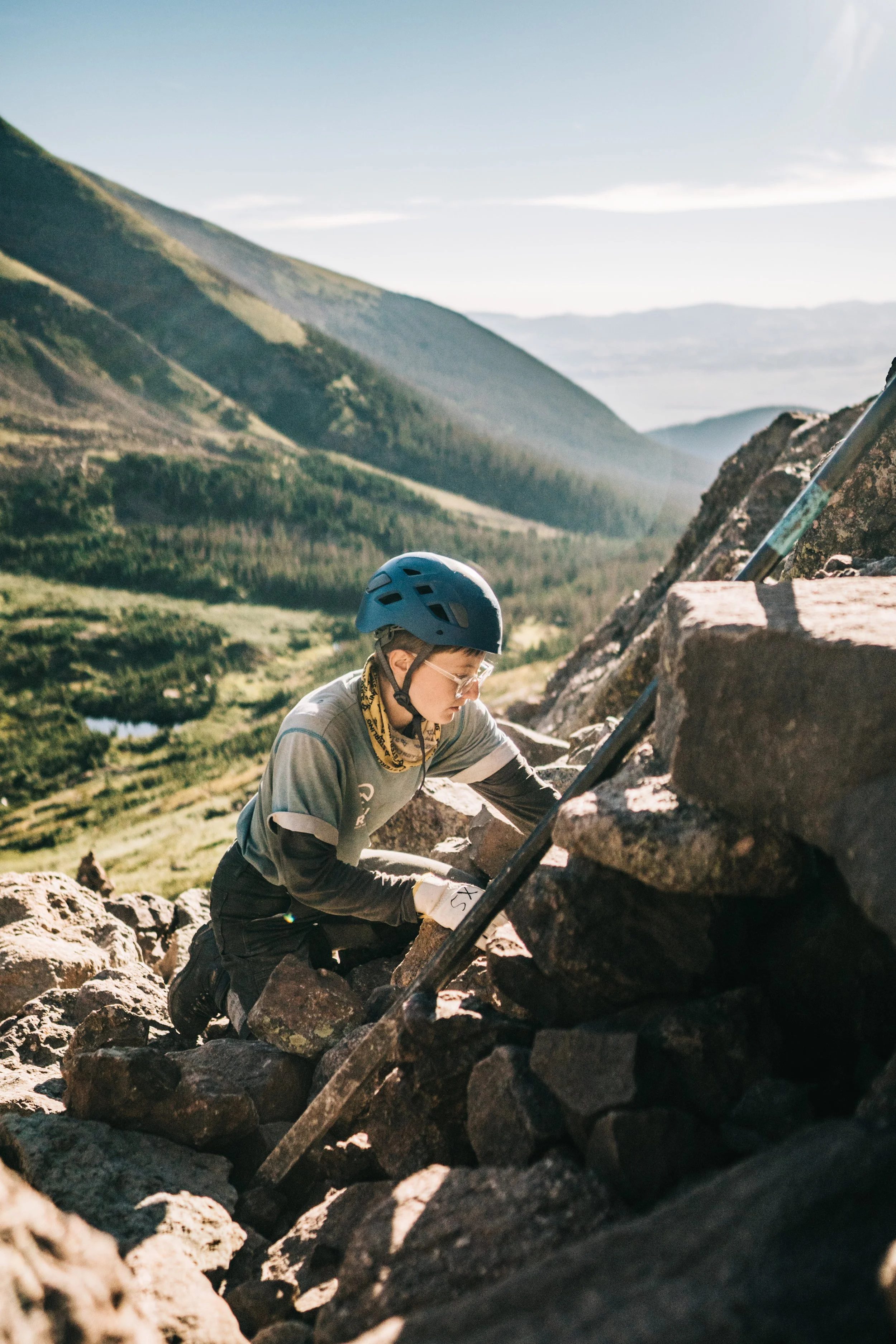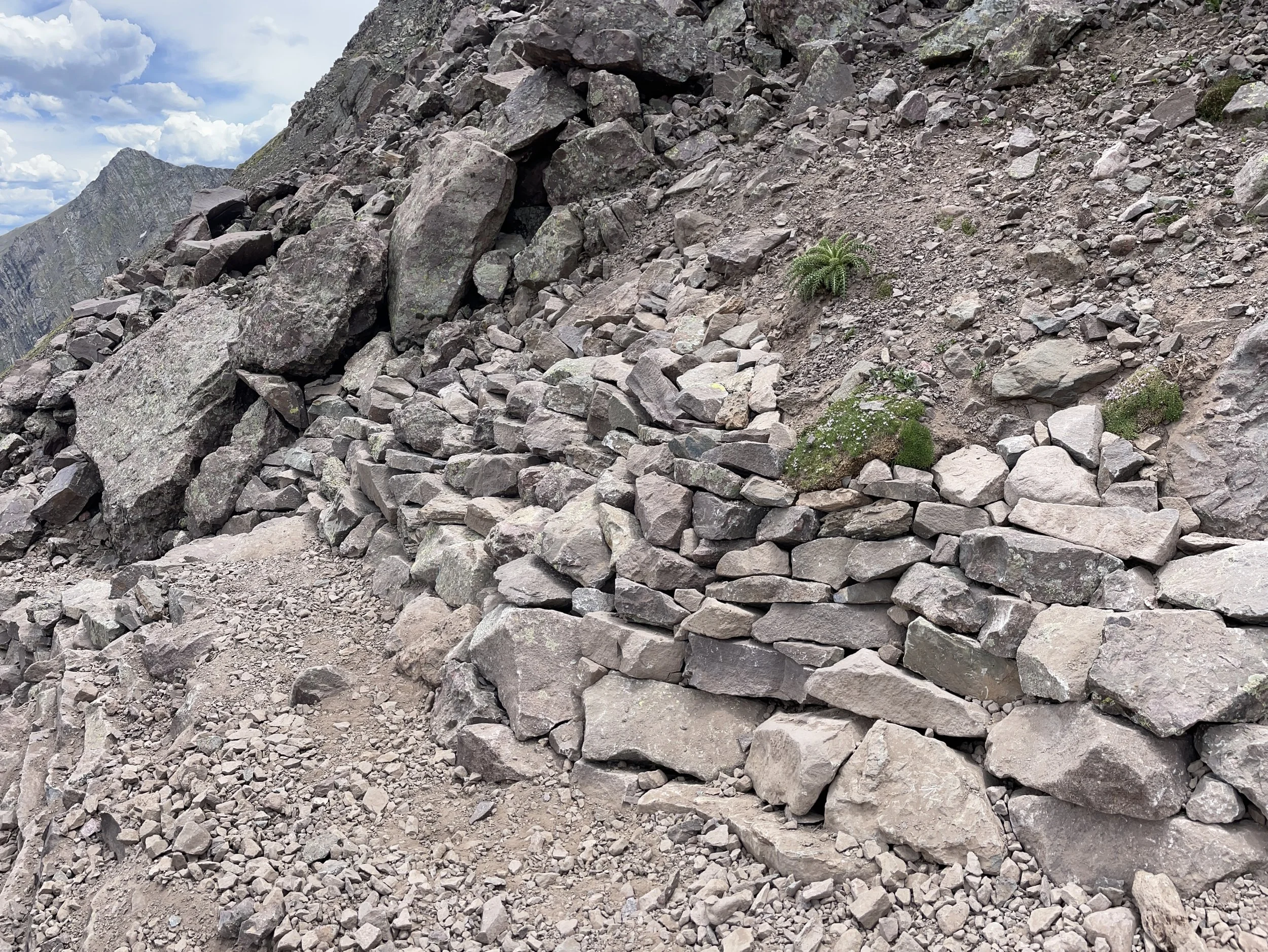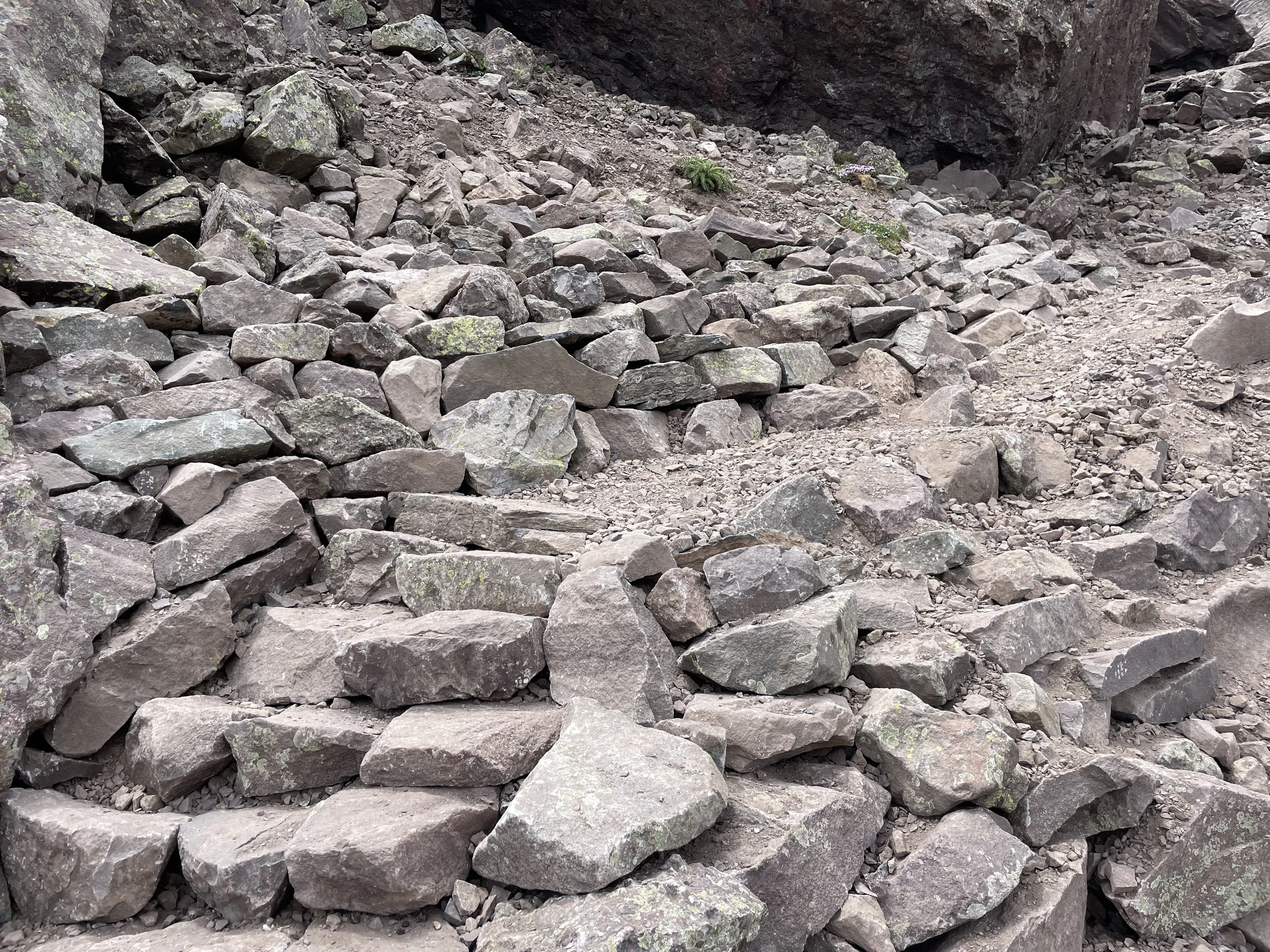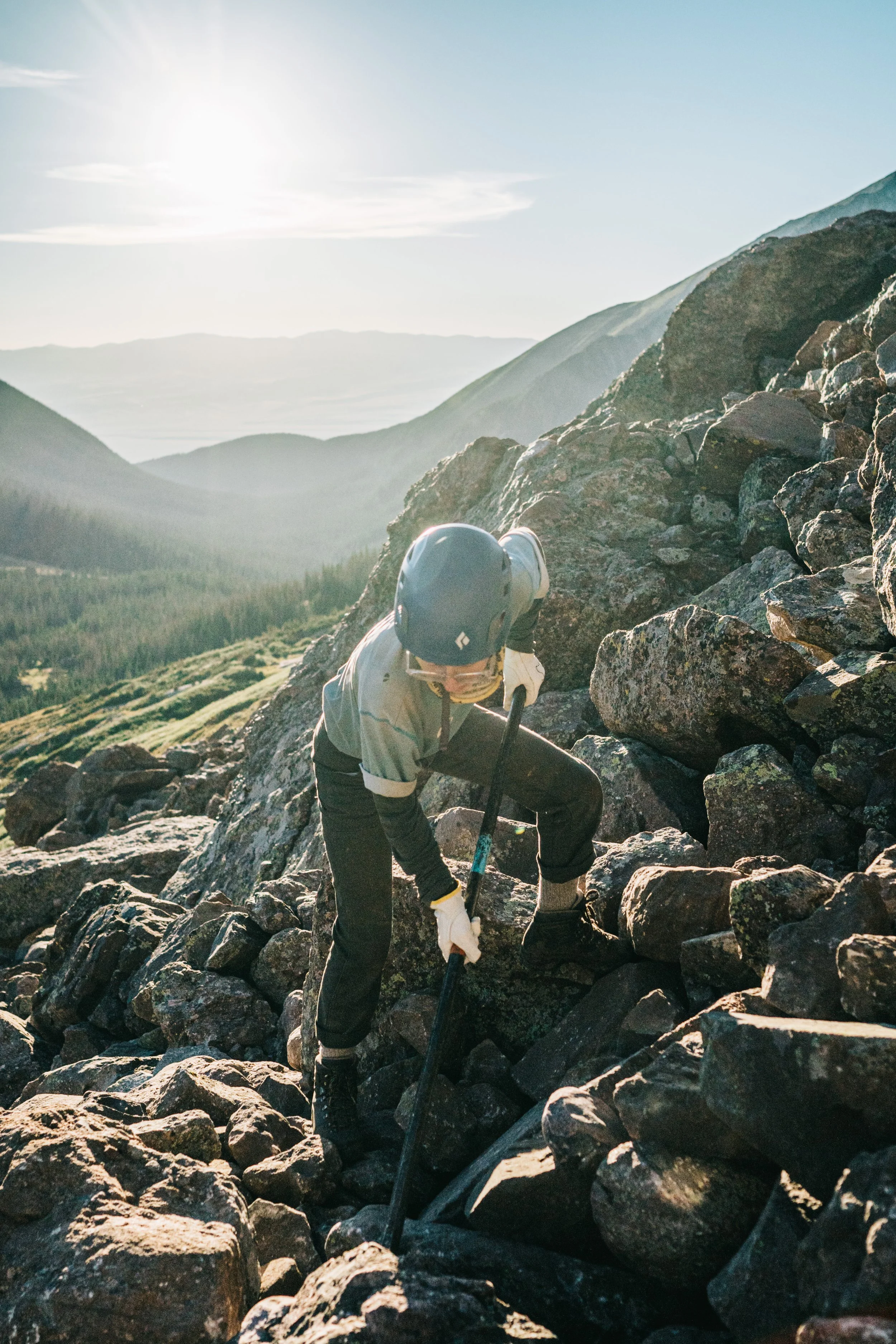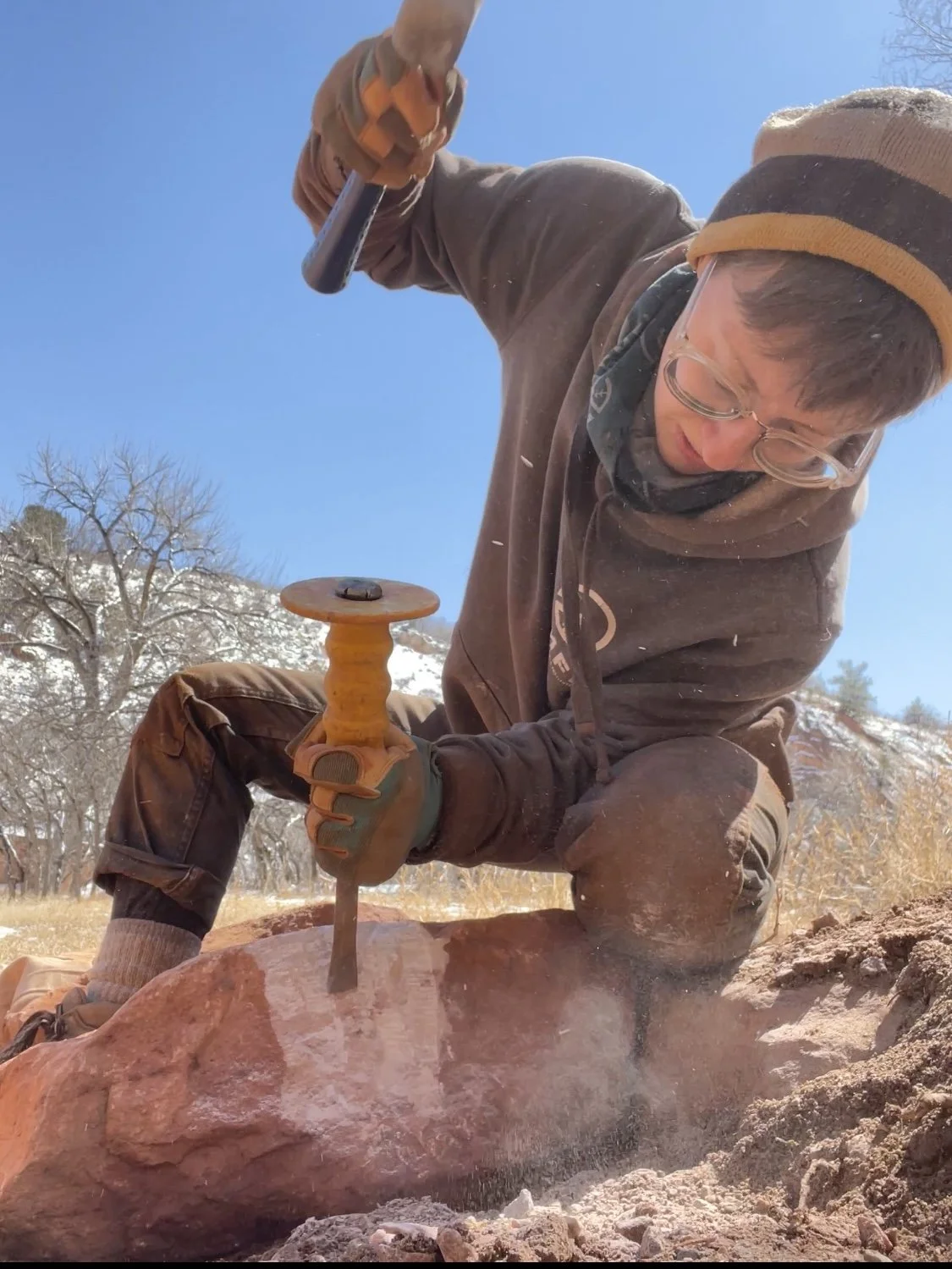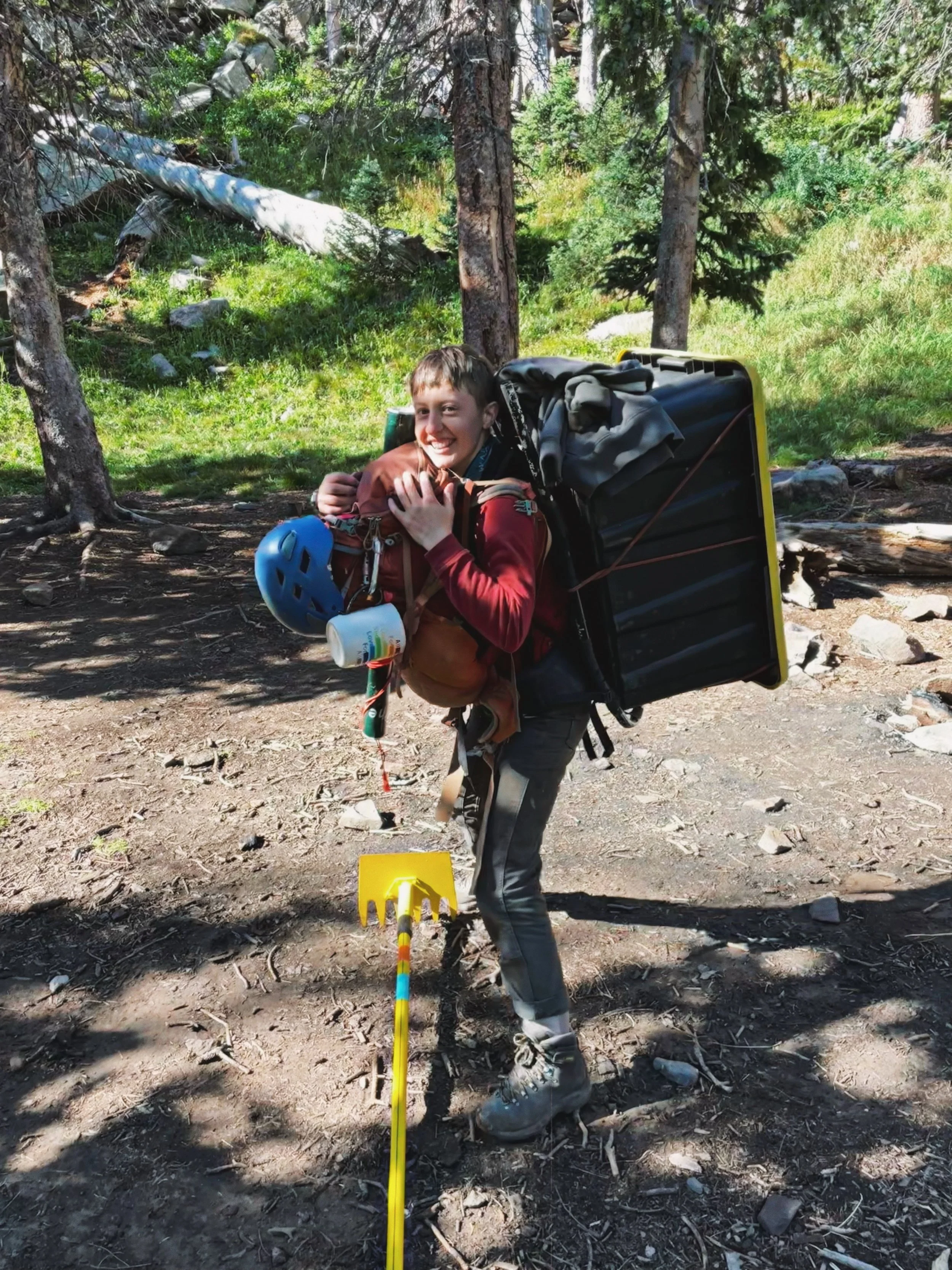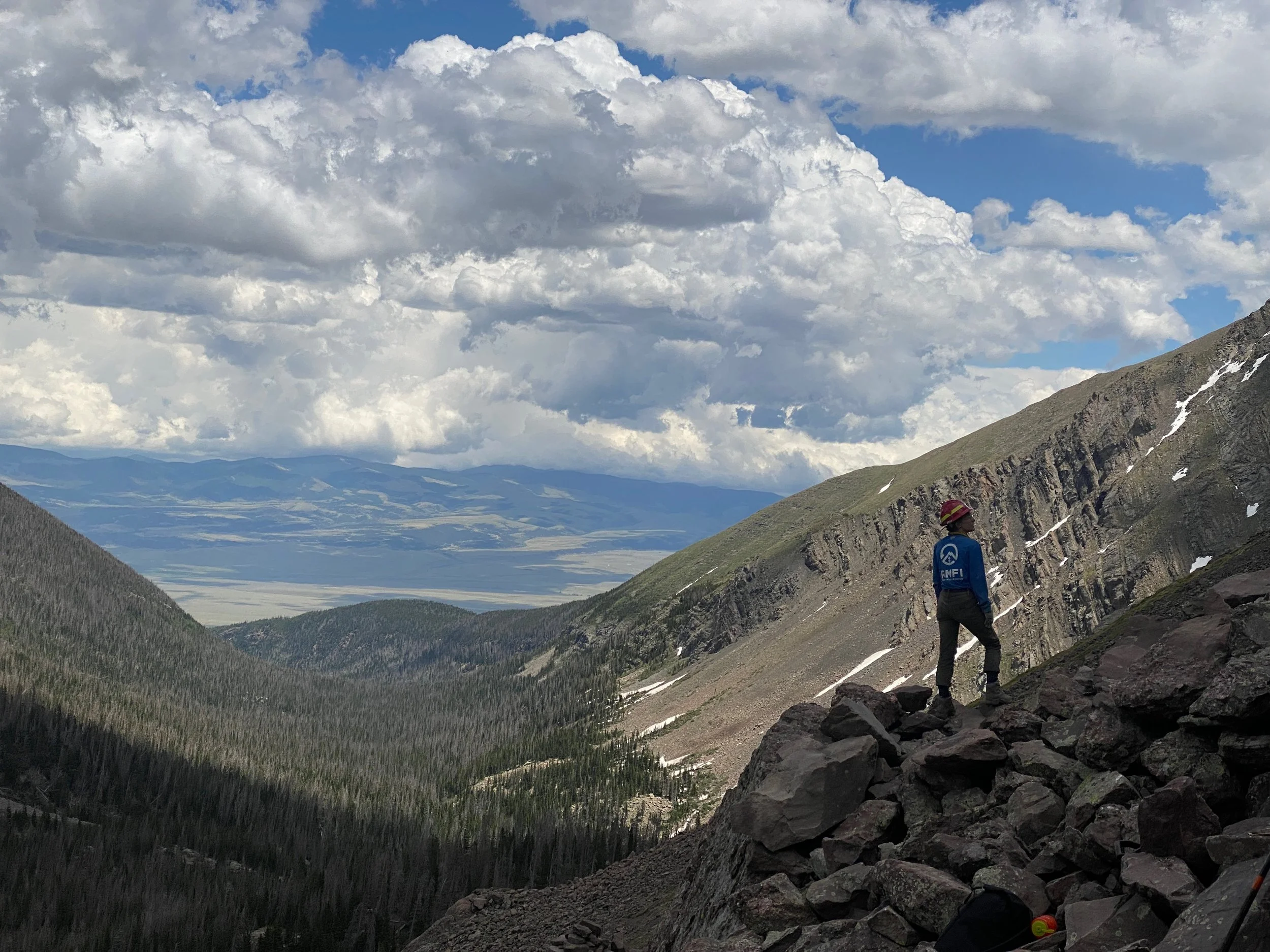Arlo Lynne: Embracing the Improbable
I first met Arlo (he/they) in 2020 when I was working as a field instructor for Rocky Mountain Field Institute. They were a student in the Earth Corps Field Studies program, which that year was taking place at the 11,500-ft Willow Lakes Basin in the Sangre de Cristo Wilderness, Colorado. They were among a small group of students spending 18 days in the mountains, learning trail work, wilderness ethics, and other subjects from visiting lecturers. Trailwork consisted of rock work at about 13,000 ft in elevation, on a steep, exposed mountainside.
Arlo’s strength and knack for trailwork was immediately apparent as they dove into this novel, grueling activity with quiet focus and vigor. By the end of the program, they told me they wanted to return next year as a crew member. And they did.
I’ve always been impressed by Arlo’s low-key tenacity and high-key skill when it came to trails. Like many trail workers, Arlo stumbled into the profession and discovered a zeal for it, most especially for stonework.
I reconnected with Arlo to share their story ane their reflections on life, trails, and grotesque amounts of Oreos.
Arlo Lynn: My name is Arlo! My pronouns are he/they and I’m 25. I was born and raised in Colorado Springs, CO. I do trail work for a local non-profit called Rocky Mountain Field Institute.
Joe Gibson: How did you get into doing trail work and how long have you been doing it?
AL: This is my third season doing trail work so that makes it about two and half years. As for how I got into trail work: I stumbled into it during a moment in time I lacked direction in my life. I was scrambling to graduate college in the midst of the COVID-19 pandemic. As a result, I ended up spending 18 days in Willow Lake Basin with RMFI as the capstone course for my degree program. Beyond finding a passion for trail work, my time there felt like a rebirth of sorts. The prolonged quiet and solitude allowed me introspection, making room for newfound compassion for my odd existence. I found that it was easier to accept pieces of myself, most notably my transness, without the burden of my shame. I carried that feeling home with me and I am resolved in pursuing the fullest extent of my being to this day. If not for that experience, I’m unsure I would be where I am now; I’m more myself than I have ever been. I look back on that time with gratitude.
Arlo working on a wall on Broken Hand Pass, Sangre de Cristo Range, Colorado.
Photo by Rob Hoff
JG: What have been some of your favorite trail projects so far?
AL: Broken Hand Pass in the Sangre De Christo mountain range! The objective of the project is to delineate and stabilize the trail with various retaining walls, steps, and cairns. It’s all rock work and something everyone knows about me is that I adore rock work. I also have a fondness for alpine projects generally but South Colony Basin, where Broken Hand Pass resides, is my home. I have such a sentimental attachment to this place. It’s where I’ve experienced some of my most formative hardships and simplest joys. It's probably strange to say that Crestone Needle is one of the loves of my life but it’s true. I climbed the mountain years before I worked for RMFI and did a summit of it a second time with my crew last season. Another summit day is in the works for this season.
I produced my proudest work on Broken Hand in 2022: an entirely new switchback constructed from what used to be shapeless talus. It took every bit of mental and physical fortitude I could manage. I poured myself into that project and I’m doing the very same this season. I just finished a retaining wall and backwall built into a set of steps. It’s kind of rad. And there’s still 3 hitches worth of work remaining. The culmination of all I’ve done in this basin really is something else. It’s hard to believe at times.
A few coworkers and I once ranked the different projects at RMFI on a tier list. Broken Hand Pass is a solid S tier for sure.
Arlo’s handiwork on Broken Hand Pass, Sangre de Cristo Range, Colorado.
Image courtesy of Arlo Lynn
JG: What gets you out of bed (or your tent) every morning and inspires you to pick up a tool to build trails?
AL: Connection to the natural world is the center of my life. I am constantly astonished at this Earth’s capacity for life and being given the ability to take part of it is an honor. Offering a piece of myself to places that have taken such care of me is my biggest motivation. I find the most inspiration working on 14er trails like Broken Hand Pass. These projects have a way of making me feel profoundly small. Life will move on with or without me. There’s an odd comfort in that. Standing at the feet of stone giants, my efforts feel a bit like hubris but I remain dedicated to my work anyway. These mountains have lived millions of my lifetime. They’re inorganic but to me seem full of life, their faces watching over me with stoic kindness. These mountains have challenged me and they have loved me. They, without judgment, have seen me at my best and at my worst. They’ve shaped me into the person I am today. Giving thanks in the form of trail work is the best I can do with the fleeting timeline of my life. I can’t think of a better way to spend it.
But when all else fails, thinking about the grotesque amount of oreos I’ll get to eat back at camp keeps me going.
Arlo working on a wall on Broken Hand Pass, Sangre de Cristo Range, Colorado.
Photo by Rob Hoff
JG: What aspects of the job do you enjoy most?
AL: There’s a lot I love about this job. The more I do it, the more I find there is to love about it and it’s difficult to summarize. To name a few: I love the fulfillment that comes out of creating things from the earth with tremendous physical effort. I love shitty hitch coffee, post-workday snacks of a deranged variety, and sleeping unreasonably well in my tent. I love the folks I meet; the sincerity of human connection through trail work, the stupid jokes, and camp shenanigans. Laughter comes easy in the simplicity of backcountry life, among friends both human and not.
And I love the person trail work allows me to be.
Trail work reveals an underlying strength within. Call it masochism or call it passion but trail workers embrace shitty conditions with a smile, willingly subjecting themselves to intense labor for 8 or more consecutive days. We bond over hardship, finding family through these powerful, shared experiences. I can't help but feel like I’m witnessing the best humanity has to offer, a collective effort towards the improbable. So often I find myself in absurd situations: grappling with a rock several times my bodyweight, losing brain cells to a complex timber wall, or contending with a hung up tree that could kill me. These are some of my most cherished memories. On the other side of these challenges, there is growth. I always return home content with exhaustion and new personal discoveries to unpack.
Shaping sandstone in southern Colorado for a trail project.
Image courtesy of Arlo Lynn
JG: What aspects of working in trails do you find most challenging?
AL: Interacting with the public can be difficult, despite the majority of folks being receptive to or appreciative of trail work. There are things I expect when confronted with disgruntled hikers and then there are are things I don’t, such as having my work compared to the holocaust or being called a homophobic slur for asking someone to stay on the trail. These are moments that weigh on me. These are moments that make me think “I don’t get paid enough for this shit”.
So yeah, the other thing is the pay. There’s constant joking on trail crews about how terrible the pay is. It’s funny but at times it feels a little too real because it is. If I dwell for too long on the amount I get paid, apathy creeps into my work and I hate that. I adore my job and I don’t want that to change. The last thing I want is to become burnt out on trail work because of money. The good news is that there’s ways around it: I live in a house shared by myself and a group of 4 other outdoor-loving queer folks. With the help of others, I think I can manage being a dirtbag for a good while longer.
Arlo confirms adequate trench depth.
JG: You’re finishing up your first season as a crew leader. What have been some of the takeaways from this first season as a leader?
AL: There’s a lot of unlikely people that work in trails. I never intended to find myself in a leadership position. It’s another one of those things I stumbled into. I pushed myself farther from my comfort zone than I ever planned to and, as difficult as it has been at times, I’m glad I did it. When I first stepped into my role as crew lead, it felt like I threw myself off of a cliff and wasn’t sure where or if I’d land. “I’ll figure it out later” I told myself and leapt. Leadership isn’t something that has ever come naturally to me. In fact, it runs contrary to integral parts of my being. I am nothing close to the archetypal leader people have in mind. I’m a soft-spoken trans guy with social anxiety. And I’m 5 feet tall.
So what? I’m learning that those things don’t matter. I’m figuring out my own flavor of leadership as I go, one with compassion at its core. I believe in the capacity of those on my crew to accomplish whatever goal is put before them. With that in mind, I try to act as a guiding resource people can come to for help rather than a strict, scrutinizing boss. It’s important to give people enough space to work through a difficult task in their own way but to be close at hand to offer support when needed. I want to lead by example and with kindness, demonstrating a calm confidence that puts people at ease. I want to be a leader that produces work that speaks for me when my words fail me. Old, white men who think they know more than me be damned.
I’m also learning that I can’t do it all on my own. It’s important to admit when I don’t know the best course of action or when I need support. I’m stubborn. I never ask for help until I’m at the end of my rope and I find it difficult to give up control over projects I have a vision for. I have stupid ideas that often work but my way isn’t objectively the correct choice. Sure, there are tried and true techniques involved in trail work but beyond those, there are so many paths that lead to a satisfying outcome. Trail work is a collaborative endeavor; each person on the crew has unique skill and perspective to offer, even if it’s their first day on the job.
I’m an endless work in progress. I fuck up from time to time and I know nowhere near everything but I think I’m starting to find my footing. Each day I gain a little more confidence.
RMFI Garden of the Gods Crew 2021.
From left to right: the author, Arlo, Elizabeth Barber, Alex Delhagen, and Heather Wilson.
JG: When you’re not doing trail work, what are some of your other hobbies?
AL: It’s likely that I spend more of my life outdoors than indoors considering that my primary hobbies are rock climbing, hiking, and mountain biking. I’m the type of person who struggles to sit still. When I manage to, I enjoy video games, cooking, writing, and the occasional art related nonsense.
JG: How has trail work complemented your interests in climbing and cycling?
AL: Well, I have abs now as a result of doing trail work so that’s kinda cool. Vanity aside, I’m in the best physical condition of my life which lends itself to making me a stronger climber and mountain biker. More than that, I get to feel that I’m giving back to the places I recreate in, so I can play in the dirt with less guilt.
I coast during the off-season, scrambling to find ways to fill the unstructured time in-between. That mostly involves the usual hobbies I mentioned previously. I also have a dog named Beans to catch up on adventures with and a partner to make crepes for.
Hauling gear into a backcountry site.
Image courtesy of Arlo Lynn
JG: What advice would you give to someone entering their first season of trail work?
AL: Embrace the unknown, the absurd, and the seemingly impossible to surmount challenges you’ll face. You’re capable of far more than you think. Learn how to rely on yourself and others. Show yourself compassion.
Here’s a real pro tip though: you think you don’t need a wag bag during the work day but you do. Just bring the wag bag. The camp chili will come for you.
Arlo on Broken Hand Pass, Colorado.
Image courtesy of Arlo Lynn.
